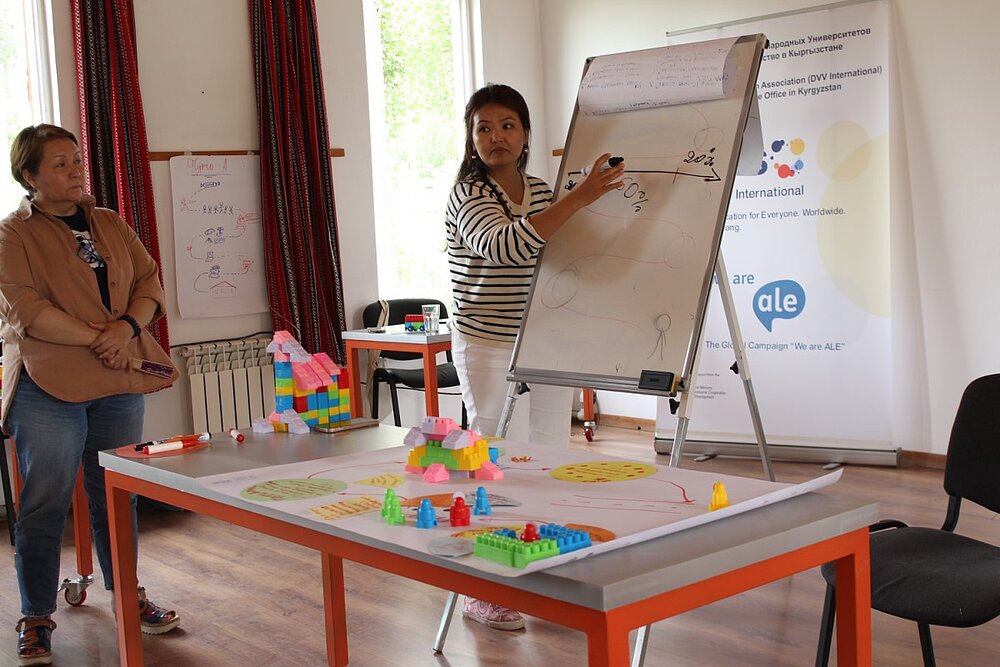Since 2002, DVV International has been supporting adult learning and education (ALE) in Kyrgyzstan. To strengthen the capacities of local ALE-centres, DVV International supports the training of educational and administrative personnel, the updating of curricula and the preparing of materials. In 2022 and 2023, DVV International expanded these efforts by piloting the Curriculum managerALE in Kyrgyzstan. This curriculum, which had previously been implemented in Cambodia and Lao PDR, aims to further strengthen the management and delivery of non-formal education. With this article, we are sharing insights about our approach and lessons learned from the process.
The network of Adult Training Centres (ATCs) – all members of the Kyrgyz Adult Education Association (KAEA)[1] – was selected as the main partner. The piloting process started with an online presentation of the curriculum to potential participants – directors of ATCs under the KAEA, as well as representatives of ATCs based in public libraries and other partner NGOs. In addition, an implementation approach was developed, local trainers were selected and further topics relevant to the Kyrgyz context were identified.
Participants were selected based on a consideration of their CVs and motivation letters, which resulted in the formation of a training group of 19 participants. Most of them were managers of KAEA member organisations, and two representatives of other partner organisations were also included.
The piloting programme consisted of six modules and covered all aspects of adult learning centres. The topics included needs assessment, strategic planning, communication, networking, leadership, financial management, as well as monitoring and evaluation. A total of eleven local trainers were involved in the piloting, four of whom were Curriculum globALE graduates.
The first five modules were delivered in a blended format: participants attended a four-day in-person training during which the trainers provided the theoretical background and guidance. Participants then worked in small groups to develop their ideas and present them in the plenum. In addition, online sessions were held to discuss completed homework assignments and individual learning outcomes. The online part lasted eight hours, which was split into two sessions of four hours each. The sixth module was conducted entirely face-to-face as it was the final module where the implementation of the training programme was summarised, and certificates were awarded to participants and trainers.
The most important feedback and lessons learned were as followed:
- Overall, the piloting was evaluated positively. According to the feedback of the participants, the training gave them an opportunity not only to build their personal capacity and apply their knowledge and skills in the development of their organisations, but also to improve relations within the team and increase interaction with public and private partners, as well as with consumers of their educational services.
- The combination of general approaches to ALE management and topics that were based on local legislation and its implementation practices, increased the effectiveness of the training. Participants noted improvement in their management competencies and their ability to implement innovative changes in their ATCs. These included: improving the quality of training programmes by strengthening partnerships with organisations, implementing a quality assurance system, developing digital competencies of staff, increasing the use of online platforms and educational resources for training, etc.
- According to the results of the accompanying study conducted by WINS Global Consult GmbH in 2023, the adaptation of the learning content to the local context is a necessary prerequisite for a successful implementation. The evaluation experts also emphasised how important it is to address both middle level managers and senior staff. In addition, the Curriculum mangerALE training should include topics and blocks aimed at developing sustainability of ALE institutions, such as funding strategy, project work and tracking donors. Finally, the level of complexity of the training programme should always be adapted to the needs of the participants.
- Strengthening the capacity of individual ATCs has had a positive effect in increasing the potential of the entire KAEA network.
Given the positive impact of the piloting on the institutional development of the partner organisations and their networks in Kyrgyzstan, a plan was made to repeat the implementation of Curriculum managerALE in the future and to conduct trainings for the participants from the network of Adult Training Centres, located at public libraries in the different regions of the country and united in the Public Foundation “Information Resource Centres”.




